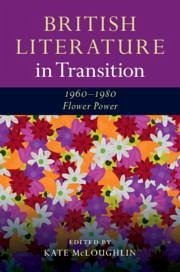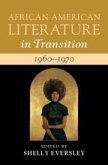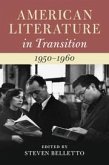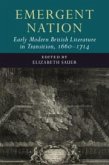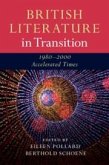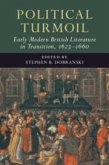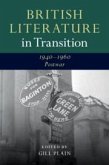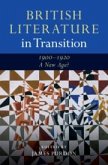British Literature in Transition, 1960-1980: Flower Power
Herausgeber: Mcloughlin, Kate
British Literature in Transition, 1960-1980: Flower Power
Herausgeber: Mcloughlin, Kate
- Gebundenes Buch
- Merkliste
- Auf die Merkliste
- Bewerten Bewerten
- Teilen
- Produkt teilen
- Produkterinnerung
- Produkterinnerung
This volume traces transitions in British literature from 1960 to 1980, illuminating a range of authors, texts, genres and movements.
Andere Kunden interessierten sich auch für
![African American Literature in Transition, 1960-1970 African American Literature in Transition, 1960-1970]() African American Literature in Transition, 1960-1970136,99 €
African American Literature in Transition, 1960-1970136,99 €![American Literature in Transition, 1950-1960 American Literature in Transition, 1950-1960]() American Literature in Transition, 1950-1960155,99 €
American Literature in Transition, 1950-1960155,99 €![Emergent Nation: Early Modern British Literature in Transition, 1660-1714: Volume 3 Emergent Nation: Early Modern British Literature in Transition, 1660-1714: Volume 3]() Emergent Nation: Early Modern British Literature in Transition, 1660-1714: Volume 3175,99 €
Emergent Nation: Early Modern British Literature in Transition, 1660-1714: Volume 3175,99 €![British Literature in Transition, 1980-2000 British Literature in Transition, 1980-2000]() British Literature in Transition, 1980-2000151,99 €
British Literature in Transition, 1980-2000151,99 €![Political Turmoil: Early Modern British Literature in Transition, 1623-1660: Volume 2 Political Turmoil: Early Modern British Literature in Transition, 1623-1660: Volume 2]() Political Turmoil: Early Modern British Literature in Transition, 1623-1660: Volume 2175,99 €
Political Turmoil: Early Modern British Literature in Transition, 1623-1660: Volume 2175,99 €![British Literature in Transition, 1940-1960: Postwar British Literature in Transition, 1940-1960: Postwar]() British Literature in Transition, 1940-1960: Postwar155,99 €
British Literature in Transition, 1940-1960: Postwar155,99 €![British Literature in Transition, 1900-1920: A New Age? British Literature in Transition, 1900-1920: A New Age?]() British Literature in Transition, 1900-1920: A New Age?139,99 €
British Literature in Transition, 1900-1920: A New Age?139,99 €-
-
-
This volume traces transitions in British literature from 1960 to 1980, illuminating a range of authors, texts, genres and movements.
Hinweis: Dieser Artikel kann nur an eine deutsche Lieferadresse ausgeliefert werden.
Hinweis: Dieser Artikel kann nur an eine deutsche Lieferadresse ausgeliefert werden.
Produktdetails
- Produktdetails
- Verlag: Cambridge University Press
- Seitenzahl: 404
- Erscheinungstermin: 20. Dezember 2018
- Englisch
- Abmessung: 236mm x 164mm x 32mm
- Gewicht: 703g
- ISBN-13: 9781107129573
- ISBN-10: 1107129575
- Artikelnr.: 53169801
- Herstellerkennzeichnung
- Libri GmbH
- Europaallee 1
- 36244 Bad Hersfeld
- gpsr@libri.de
- Verlag: Cambridge University Press
- Seitenzahl: 404
- Erscheinungstermin: 20. Dezember 2018
- Englisch
- Abmessung: 236mm x 164mm x 32mm
- Gewicht: 703g
- ISBN-13: 9781107129573
- ISBN-10: 1107129575
- Artikelnr.: 53169801
- Herstellerkennzeichnung
- Libri GmbH
- Europaallee 1
- 36244 Bad Hersfeld
- gpsr@libri.de
Part I. Ventures in Form: 1. Error and experiment in the 1960s British
novel Julia Jordan; 2. 'A different inclusiveness': reading poetry from the
group to the British poetry revival Hannah Brooks-Motl; 3. 'A revolutionary
proposal': Alexander Trocchi, dramaturgies of disruption and situationist
genealogies Grant Tyler Peterson; Part II. Emergent Identities: 4. 'Sight,
sounds and meaning': voice/print transitions in black British poetry
Rachael Gilmour; 5. Fate and freedom in the fiction of the second wave
Abigail Rine Favale; 6. Affluence and its discontents: working-class
literature of the 1960s and 1970s Katy Shaw; 7. Coming out: the emergence
of gay literature Alison Hennegan; Part III. Changing Minds: 8. From
countryside to environment: reaching common ground Terry Gifford; 9.
Nostalgia and the elegiac mode Marina MacKay; 10. The spiderhood:
psychedelic literature, literary psychedelia and the writing of LSD James
Riley; 11. 'Little things': writing the sexual revolution Claire
O'Callaghan; 12. Inhuman factors: the intelligence of British spy fiction
David Pascoe; Part IV. Local and Regional Developments; 13. In and out of
the nation: Poetry Wales in the 1960s and 1970s Matthew Jarvis; 14.
Performing on the fringe: Basil Bunting and Morden Tower Edward Allen; 15.
Rejecting the knitted claymore: the challenge to cultural nationalism in
Scottish literary magazines of the 1960s and 1970s Eleanor Bell; 16. Oh so
loinerly: geographical transitions and the struggle to belong in Tony
Harrison's The Loiners Rory Waterman; 17. The end of 'home': Heaney,
Muldoon and the return of the dead Peter Mackay; Part V. Individual
Transitions: 18. Iris Murdoch: an anatomy of failure James Clements; 19.
Larkin's light Kate McLoughlin; 20. 'Operating on life, not in it': gender
and relationships in the plays of Harold Pinter Mark Taylor-Batty; 21. 'The
small box': Ted Hughes and the figure of the child S. J. Perry; 22. Caryl
Churchill and the vectors of unhappiness Rachel Clements.
novel Julia Jordan; 2. 'A different inclusiveness': reading poetry from the
group to the British poetry revival Hannah Brooks-Motl; 3. 'A revolutionary
proposal': Alexander Trocchi, dramaturgies of disruption and situationist
genealogies Grant Tyler Peterson; Part II. Emergent Identities: 4. 'Sight,
sounds and meaning': voice/print transitions in black British poetry
Rachael Gilmour; 5. Fate and freedom in the fiction of the second wave
Abigail Rine Favale; 6. Affluence and its discontents: working-class
literature of the 1960s and 1970s Katy Shaw; 7. Coming out: the emergence
of gay literature Alison Hennegan; Part III. Changing Minds: 8. From
countryside to environment: reaching common ground Terry Gifford; 9.
Nostalgia and the elegiac mode Marina MacKay; 10. The spiderhood:
psychedelic literature, literary psychedelia and the writing of LSD James
Riley; 11. 'Little things': writing the sexual revolution Claire
O'Callaghan; 12. Inhuman factors: the intelligence of British spy fiction
David Pascoe; Part IV. Local and Regional Developments; 13. In and out of
the nation: Poetry Wales in the 1960s and 1970s Matthew Jarvis; 14.
Performing on the fringe: Basil Bunting and Morden Tower Edward Allen; 15.
Rejecting the knitted claymore: the challenge to cultural nationalism in
Scottish literary magazines of the 1960s and 1970s Eleanor Bell; 16. Oh so
loinerly: geographical transitions and the struggle to belong in Tony
Harrison's The Loiners Rory Waterman; 17. The end of 'home': Heaney,
Muldoon and the return of the dead Peter Mackay; Part V. Individual
Transitions: 18. Iris Murdoch: an anatomy of failure James Clements; 19.
Larkin's light Kate McLoughlin; 20. 'Operating on life, not in it': gender
and relationships in the plays of Harold Pinter Mark Taylor-Batty; 21. 'The
small box': Ted Hughes and the figure of the child S. J. Perry; 22. Caryl
Churchill and the vectors of unhappiness Rachel Clements.
Part I. Ventures in Form: 1. Error and experiment in the 1960s British
novel Julia Jordan; 2. 'A different inclusiveness': reading poetry from the
group to the British poetry revival Hannah Brooks-Motl; 3. 'A revolutionary
proposal': Alexander Trocchi, dramaturgies of disruption and situationist
genealogies Grant Tyler Peterson; Part II. Emergent Identities: 4. 'Sight,
sounds and meaning': voice/print transitions in black British poetry
Rachael Gilmour; 5. Fate and freedom in the fiction of the second wave
Abigail Rine Favale; 6. Affluence and its discontents: working-class
literature of the 1960s and 1970s Katy Shaw; 7. Coming out: the emergence
of gay literature Alison Hennegan; Part III. Changing Minds: 8. From
countryside to environment: reaching common ground Terry Gifford; 9.
Nostalgia and the elegiac mode Marina MacKay; 10. The spiderhood:
psychedelic literature, literary psychedelia and the writing of LSD James
Riley; 11. 'Little things': writing the sexual revolution Claire
O'Callaghan; 12. Inhuman factors: the intelligence of British spy fiction
David Pascoe; Part IV. Local and Regional Developments; 13. In and out of
the nation: Poetry Wales in the 1960s and 1970s Matthew Jarvis; 14.
Performing on the fringe: Basil Bunting and Morden Tower Edward Allen; 15.
Rejecting the knitted claymore: the challenge to cultural nationalism in
Scottish literary magazines of the 1960s and 1970s Eleanor Bell; 16. Oh so
loinerly: geographical transitions and the struggle to belong in Tony
Harrison's The Loiners Rory Waterman; 17. The end of 'home': Heaney,
Muldoon and the return of the dead Peter Mackay; Part V. Individual
Transitions: 18. Iris Murdoch: an anatomy of failure James Clements; 19.
Larkin's light Kate McLoughlin; 20. 'Operating on life, not in it': gender
and relationships in the plays of Harold Pinter Mark Taylor-Batty; 21. 'The
small box': Ted Hughes and the figure of the child S. J. Perry; 22. Caryl
Churchill and the vectors of unhappiness Rachel Clements.
novel Julia Jordan; 2. 'A different inclusiveness': reading poetry from the
group to the British poetry revival Hannah Brooks-Motl; 3. 'A revolutionary
proposal': Alexander Trocchi, dramaturgies of disruption and situationist
genealogies Grant Tyler Peterson; Part II. Emergent Identities: 4. 'Sight,
sounds and meaning': voice/print transitions in black British poetry
Rachael Gilmour; 5. Fate and freedom in the fiction of the second wave
Abigail Rine Favale; 6. Affluence and its discontents: working-class
literature of the 1960s and 1970s Katy Shaw; 7. Coming out: the emergence
of gay literature Alison Hennegan; Part III. Changing Minds: 8. From
countryside to environment: reaching common ground Terry Gifford; 9.
Nostalgia and the elegiac mode Marina MacKay; 10. The spiderhood:
psychedelic literature, literary psychedelia and the writing of LSD James
Riley; 11. 'Little things': writing the sexual revolution Claire
O'Callaghan; 12. Inhuman factors: the intelligence of British spy fiction
David Pascoe; Part IV. Local and Regional Developments; 13. In and out of
the nation: Poetry Wales in the 1960s and 1970s Matthew Jarvis; 14.
Performing on the fringe: Basil Bunting and Morden Tower Edward Allen; 15.
Rejecting the knitted claymore: the challenge to cultural nationalism in
Scottish literary magazines of the 1960s and 1970s Eleanor Bell; 16. Oh so
loinerly: geographical transitions and the struggle to belong in Tony
Harrison's The Loiners Rory Waterman; 17. The end of 'home': Heaney,
Muldoon and the return of the dead Peter Mackay; Part V. Individual
Transitions: 18. Iris Murdoch: an anatomy of failure James Clements; 19.
Larkin's light Kate McLoughlin; 20. 'Operating on life, not in it': gender
and relationships in the plays of Harold Pinter Mark Taylor-Batty; 21. 'The
small box': Ted Hughes and the figure of the child S. J. Perry; 22. Caryl
Churchill and the vectors of unhappiness Rachel Clements.

